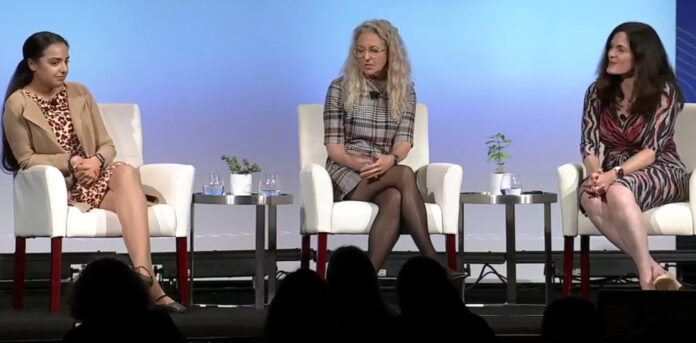Cancer survivorship is no longer a rare outcome. In the United States alone, nearly 22.5 million people are expected to be living with a history of cancer by 2032. Advances in screening, treatment, and supportive care have enabled 75% of patients to live five years or more beyond diagnosis.
Yet survivorship is not synonymous with cure. Fatigue, functional decline, secondary cancers, and cardiometabolic disease remain stubborn realities. The question is not whether patients survive, but how well they live after survival.
This is where lifestyle medicine steps in, Doctors Jasmin Hundal, Amy H. Comander, and Madeline Hardacre told LM2025 in a combined presentation today.
Despite strong endorsements from leading organisations such as ASCO, the American Cancer Society, and the World Cancer Research Fund, lifestyle interventions remain underutilised in oncology practice.
But the evidence is clear: nutrition, physical activity, stress management, sleep, and social connection can dramatically improve quality of life, reduce recurrence, and enhance treatment tolerance. But the gap between knowledge and practice persists.
Physical activity
Few interventions are as well‑documented as physical activity, they told the conference. Prospective studies in breast and colon cancer show that patients who meet exercise guidelines before and after diagnosis experience significantly lower recurrence and mortality risks.
The CHALLENGE trial, published in NEJM in 2025, demonstrated that structured exercise programs improved disease‑free survival in colon cancer patients compared to health education alone. Resistance training preserves muscle mass, aerobic activity supports cardiovascular fitness, and adverse events are rare when prescriptions are individualized.
Yet most survivors fall short of recommended activity levels. Oncology clinics, pressed for time and burdened by workflow constraints, often fail to integrate exercise counseling into routine care. This is a missed opportunity. Exercise is not an optional add‑on; it is a cornerstone of survivorship medicine.
Diet quality is another decisive factor. Malnutrition worsens prognosis, while obesity and weight gain compound comorbidities and may promote cancer progression. High‑quality dietary patterns—Mediterranean, DASH, or plant‑forward approaches—are consistently linked to lower cancer incidence and mortality. The ACS guidelines emphasize nutrient‑dense, minimally processed, plant‑predominant foods.
Lack of evidence
Importantly, restrictive diets such as keto or fasting lack sufficient evidence in oncology. Survivors need practical, sustainable advice: whole foods, fibre-rich meals, and abundant fruits and vegetables. The Women’s Health Initiative found that low diet quality after breast cancer diagnosis increased mortality risk, while the Nurses’ Health Study showed that high fruit and vegetable intake reduced all‑cause mortality.
Nutrition counseling should be as routine as chemotherapy dosing. Yet surveys reveal that only a fraction of oncologists feel adequately trained to discuss diet, and fewer still have referral resources at hand.
Cancer is not only a biological disease; it is a psychosocial and existential crisis. Chronic stress impairs immunity, increases inflammation, and worsens outcomes. Evidence‑based strategies—mindfulness, meditation, yoga, acupuncture, and physical activity—reduce anxiety and improve resilience. Tailoring interventions to patient preferences enhances adherence.
Sleep, too, is a neglected pillar. Short sleep duration and circadian rhythm disruption are linked to impaired DNA repair, hormonal dysregulation, and tumor growth. Survivors who sleep fewer than five hours per night face higher mortality risks compared to those achieving seven to nine hours. Adequate sleep supports immune function and reduces inflammation, yet sleep counseling is rarely part of oncology visits.
Finally, social connection matters. Isolation and loneliness increase hospitalizations, healthcare costs, and mortality risk. The U.S. Surgeon General has called loneliness an epidemic, and cancer survivors are particularly vulnerable. Strong social networks improve quality of life and reduce symptom burden. Survivorship care must recognize that healing is not only physical but relational.
Familiar barriers
Why, then, is lifestyle medicine underutilised? The barriers are familiar: limited awareness among oncologists, time constraints in busy clinics, lack of training, inadequate referral resources, financial inequities, and psychosocial challenges such as fatigue and depression.
Solutions exist. Education programs can build provider confidence. Shared medical visits offer efficiency and peer support. Telehealth expands reach to rural and underserved populations. Innovative strategies—community partnerships, culturally tailored interventions, and advocacy for insurance coverage—can bridge gaps.
The call to action is clear: survivorship care requires a team approach. No single provider can meet all needs. Oncology dietitians, physical therapists, behavioral health specialists, and community organizations must collaborate. Lifestyle medicine conversations should begin at diagnosis, continue through treatment, and extend into survivorship.
The National Cancer Institute defines survivorship as encompassing the health and well‑being of a person with cancer from diagnosis until the end of life. This includes physical, mental, emotional, social, and financial effects. Family members and caregivers are part of this experience. Survivorship is not a static state but a dynamic journey.
Lifestyle medicine reframes survivorship from mere endurance to active pursuit of health. It empowers patients to reclaim agency, reduce recurrence risks, and live with vitality. The science is robust, the guidelines are clear, and the moral imperative is undeniable.
Cancer survivorship is poised to become one of the defining public health challenges of our time. The growing population of survivors demands more than surveillance scans and follow‑up visits. They deserve integrated care that addresses the whole person. Lifestyle medicine is not a luxury; it is a necessity.
The oncology community must move beyond rhetoric and embed lifestyle interventions into standard practice. Survivorship is not just about living longer—it is about living better.





